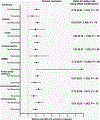No Impact of Concomitant Medications on Efficacy and Safety of Biologics and Small Molecules for Ulcerative Colitis
- PMID: 39395572
- PMCID: PMC12186698
- DOI: 10.1016/j.cgh.2024.08.040
No Impact of Concomitant Medications on Efficacy and Safety of Biologics and Small Molecules for Ulcerative Colitis
Abstract
Background & aims: Although participants with inflammatory bowel diseases in clinical trials of biologics and small molecule drugs (henceforth, advanced therapies) frequently receive several medications concomitantly, it is unclear how they modify treatment effect.
Methods: Through an individual patient data pooled analysis of 10 clinical trials of advanced therapies for moderate-to-severe ulcerative colitis, we assessed whether concomitant exposure to corticosteroids, immunomodulators, mesalamine, proton pump inhibitors, histamine receptor antagonists, opiates, antidepressants, and antibiotics modified the effect of the intervention on treatment efficacy and safety outcomes, using modified Poisson regression model.
Results: Of 6044 patients (4280 receiving intervention, 1764 receiving placebo), several received concomitant corticosteroids (47%), immunomodulators (28%), mesalamine (68%), proton pump inhibitors (14%), histamine receptor antagonists (2%), opiates (7%), antidepressants (6%), and/or antibiotics (5%). After adjusting for confounders and examining treatment efficacy of intervention versus placebo, we observed no impact of concomitant exposure to corticosteroids (ratio of relative risk of drug vs placebo with vs without concomitant exposure: ratio of risk ratio [RRR], 0.81 [95% confidence interval, 0.63-1.06]), mesalamine (RRR, 1.04 [0.78-1.39]), proton pump inhibitors (RRR, 0.87 [0.61-1.22]), histamine receptor antagonists (RRR, 1.72 [0.97-14.29]), opiates (RRR, 0.90 [0.54-1.49]), antidepressants (RRR, 1.02 [0.57-1.83]), and antibiotics (RRR, 0.72 [0.44-1.16]) on likelihood of clinical remission. Concomitant exposure to immunomodulators was associated with lower likelihood of achieving clinical remission (RRR, 0.73 [0.55-0.97]), particularly with non-tumor necrosis factor antagonists.
Conclusions: In clinical trials of advanced therapies for ulcerative colitis, baseline concomitant exposure to multiple commonly used class of medications does not impact treatment efficacy or safety. These findings directly inform design of regulatory clinical trials with respect to managing concomitant medications at baseline.
Keywords: Concomitant Medications; Inflammatory Bowel Diseases; Trial Design; Ustekinumab; Vivli.
Copyright © 2025 AGA Institute. Published by Elsevier Inc. All rights reserved.
Conflict of interest statement
DA: No relevant disclosures
GYZ: Consultancy/advisory board fees from Alimentiv Inc.
VS: No relevant disclosures
GS: has received research grant from Pfizer
HHL: No relevant disclosures
CM: Consulting fees from AbbVie, Alimentiv, Amgen, AVIR Pharma Inc, BioJAMP, Bristol Myers Squibb, Celltrion, Ferring, Fresenius Kabi, Janssen, McKesson, Mylan, Takeda, Pendopharm, Pfizer, Roche, Sanofi; speaker’s fees from AbbVie, Amgen, AVIR Pharma Inc, Alimentiv, Bristol Myers Squibb, Ferring, Fresenius Kabi, Janssen, Takeda, Pendopharm, and Pfizer; royalties from Springer Publishing; research support from Ferring, Takeda, Pfizer.
VJ: Consultancy/advisory board fees from AbbVie, Alimentiv Inc., Arena pharmaceuticals, Asahi Kasei Pharma, Asieris, Astra Zeneca, Bristol Myers Squibb, Celltrion, Eli Lilly, Ferring, Flagship Pioneering, Fresenius Kabi, Galapagos, GlaxoSmithKline, Genentech, Gilead, Janssen, Merck, Mylan, Pandion, Pendopharm, Pfizer, Protagonist, Reistone Biopharma, Roche, Sandoz, Second Genome, Takeda, Teva, Topivert, Ventyx, and Vividion; and speaker’s fees from, Abbvie, Ferring, Galapagos, Janssen Pfizer Shire, Takeda, and Fresenius Kabi
SS: has received research grants from Pfizer
Figures



References
-
- Dubinsky MC, Collins R, Abreu MT, et al. Challenges and Opportunities in IBD Clinical Trial Design. Gastroenterology 2021;161:400–404. - PubMed
-
- Ma C, Guizzetti L, Cipriano LE, et al. Systematic review with meta-analysis: high prevalence and cost of continued aminosalicylate use in patients with ulcerative colitis escalated to immunosuppressive and biological therapies. Aliment Pharmacol Ther 2019;49:364–374. - PubMed
-
- Jones JL, Kaplan GG, Peyrin-Biroulet L, et al. Effects of Concomitant Immunomodulator Therapy on Efficacy and Safety of Anti-Tumor Necrosis Factor Therapy for Crohn’s Disease: A Meta-analysis of Placebo-controlled Trials. Clin Gastroenterol Hepatol 2015;13:2233–40 e1–2; quiz e177–8. - PubMed
MeSH terms
Substances
Grants and funding
LinkOut - more resources
Full Text Sources
Medical

